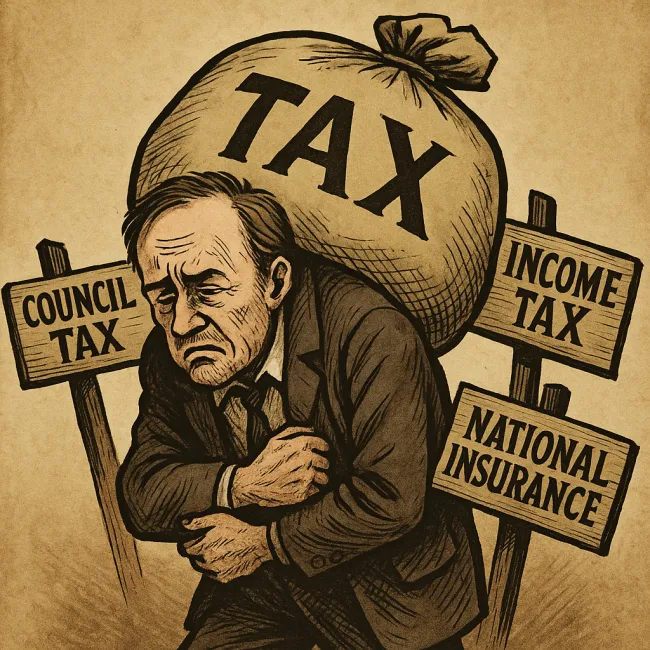
For over two centuries British political thinkers have agreed on one principle: taxation must be fair, proportionate, and matched by services the public can see and value. Adam Smith warned in 1776 that a tax should “take out and keep out of the pockets of the people as little as possible” beyond what is necessary. William Pitt the Younger said taxation must rest on public consent. Henry Grattan in 1788 condemned the hearth tax on Ireland’s poor as “a wrong” no civilised government should impose. These were not polite academic theories. They were warnings about what happens when government takes too much and gives too little. Those warnings matter now because Britain is repeating the same mistakes, and the people paying the price are not the politicians making the decisions.
Council Tax is the perfect example. A Band D bill in England has risen from £1,484 in 2015 to 2016 to £2,280 in 2025 to 2026, an increase of £796 or 53.6% in just ten years. Over the same period average weekly earnings have gone from £506 to £674, up only 33.2%, while prices have risen 41.4%. The gap is not a statistical curiosity. It is the difference between heating your home and shivering, between replacing a broken appliance and making do, between a family holiday and nothing at all. In the past year alone the average Band D bill jumped by 5.0%, far above the 3.6% inflation rate at June 2025.
This squeeze has been engineered. Central government has cut the Revenue Support Grant from over £15.0 billion in 2013 to 2014 to around £2.3 billion in 2019 to 2020. That is a cash cut of 84.7% and about 60% in real terms. Council Tax now provides 56% of councils’ core spending power compared with 36% in 2010 to 2011. Responsibilities have been dumped on local authorities without the money to meet them, forcing councils to load the shortfall directly onto household bills.
The government’s stealth taxes add more pressure. Freezing the personal allowance at £12,570 and the higher rate threshold at £50,270 since April 2021 means that every year inflation pushes millions more into paying higher tax without any real increase in spending power. By 2027 to 2028 this fiscal drag will pull an estimated 3.2 million more people into the higher rate bracket.
And now, since April 2025 the rate of employer National Insurance Contributions has risen from 13.8% to 15.0% while the secondary threshold has fallen from £9,100 to £5,000. This is not a small adjustment. It is a massive grab. Employers are paying NI on a far greater share of every employee’s earnings and at a higher rate. In the real world those costs are not be swallowed by businesses. They are passed straight to the public in higher prices at the till, slower wage growth, and fewer jobs created. This is a tax hike the government hopes you won't notice because it is hidden in the cost of everything you buy. This is a tax on 'working' people !
Meanwhile VAT at 20% continues to add a fifth to the cost of most purchases. Fuel duty inflates transport and logistics costs. Energy bills are swollen by unaffordable environmental levies. These are not abstract policies. They are the reason your weekly shop, your petrol, and your heating cost more than they should.
And for all this extra money what do people see? Fewer libraries. Reduced bin collections. Potholes that stay unfilled for months. Council services that take weeks to respond. In March 2025 unpaid Council Tax hit £6.6 billion, up £620 million or 10.4% in just twelve months. This is not about people refusing to pay. It is about people being unable to pay. While councils are blamed for rising bills, the real cause is reduced government funding as millions are wasted daily on asylum hotels, billions are sent in overseas aid, and vast sums are spent on net zero projects and foreign military commitments while local services are starved of cash.
The government’s much publicised devolution plan will not solve this. It will shuffle councils into bigger units and add more regional mayors, but it will not restore lost funding or remove the legal duties that are driving up local costs. Without fair national funding households will continue to be treated as the cash machine for a broken system.
The immediate impact is obvious. Less disposable income. More personal debt. A slower local economy. The deeper risk is far more dangerous. When taxes rise faster than wages and inflation while services visibly decline, public consent collapses. And when consent collapses, history shows what follows. Widespread refusal to pay. Mass protests. In the worst cases, civil unrest. That is the path this government is treading.
Smith, Pitt, and Grattan were right. Tax must be affordable, transparent, and matched by visible value. Today’s system fails on all three counts. This is not just about numbers on a bill. It is about a breach of the basic contract between government and people. If that breach is not repaired it will not be Westminster that pays the price. It will be the stability of the country itself.